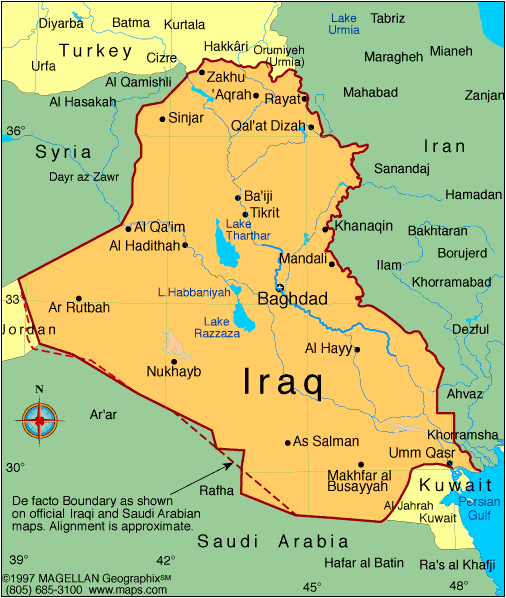IRAQ

Geography: Iraq, a triangle of mountains, desert, and fertile river valley, is bounded on the east by Iran, on the north by Turkey, on the west by Syria and Jordan, and on the south by Saudi Arabia and Kuwait. It is twice the size of Idaho. The country has arid desert land west of the Euphrates, a broad central valley between the Euphrates and the Tigris, and mountains in the northeast.
Government: The dictatorship of Saddam Hussein collapsed on April 9, 2003, after U.S. and British forces invaded the country. Sovereignty was returned to Iraq on June 28, 2004.
History: From earliest times Iraq was known as Mesopotamia—the land between the rivers—for it embraces a large part of the alluvial plains of the Tigris and Euphrates rivers.
An advanced civilization existed in this area by 4000 B.C. Sometime after 2000 B.C. , the land became the center of the ancient Babylonian and Assyrian empires. Mesopotamia was conquered by Cyrus the Great of Persia in 538 B.C. and by Alexander in 331 B.C. After an Arab conquest in 637–640, Baghdad became the capital of the ruling caliphate. The country was pillaged by the Mongols in 1258, and during the 16th, 17th, and 18th centuries was the object of Turkish and Persian competition.
Government: The dictatorship of Saddam Hussein collapsed on April 9, 2003, after U.S. and British forces invaded the country. Sovereignty was returned to Iraq on June 28, 2004.
History: From earliest times Iraq was known as Mesopotamia—the land between the rivers—for it embraces a large part of the alluvial plains of the Tigris and Euphrates rivers.
An advanced civilization existed in this area by 4000 B.C. Sometime after 2000 B.C. , the land became the center of the ancient Babylonian and Assyrian empires. Mesopotamia was conquered by Cyrus the Great of Persia in 538 B.C. and by Alexander in 331 B.C. After an Arab conquest in 637–640, Baghdad became the capital of the ruling caliphate. The country was pillaged by the Mongols in 1258, and during the 16th, 17th, and 18th centuries was the object of Turkish and Persian competition.

Map of Iraq
President: Fouad Massoum (2014)
Prime Minister: Haider al-Abadi
(2014)
Land area: 167,556 sq mi (433,970 sq
km)
Population (2014 est.): 32,585,692
(growth rate: 2.23%); birth rate: 26.85/1000; infant mortality rate:
37.53/1000; life expectancy: 71.42
Capital and largest city (2011 est.):
Baghdad, 6.036 million
Largest cities:
Mosul 1.494 million; Erbil 1.039 million; Basra 942,000; As Sulaymaniyah 867,000; Najaf 779,000
Monetary unit: U.S.
dollar
National
name: Al Jumhuriyah al Iraqiyah
Languages:
Arabic (official), Kurdish (official), Turkmen (a Turkish
dialect) and Assyrian (Neo-Aramaic) are official in areas where they
constitute a majority of the population), Armenian
Ethnicity/race:
Arab 75%–80%, Kurdish 15%–20%,
Turkoman, Assyrian, or other 5%
Religions:
Muslim (official) 99% (Shia 60%-65%, Sunni 32%-37%), Christian 0.8%, Hindu note:
while there has been voluntary relocation of many Christian families to
northern Iraq, recent reporting indicates that the overall Christian
population may have dropped by as much as 50% since the fall of the
Saddam HUSSEIN regime in 2003, with many fleeing to Syria, Jordan, and
Lebanon (2010 est.)
National Holiday:
Revolution Day, July 17
Literacy rate: 78.5% (2010 est.)
Economic summary: GDP/PPP (2013 est.):
$249.4 billion; per capita $7,100. Real growth rate: 4.2%.
Inflation: 2%. Unemployment: 16%. Arable
land: 9.19%. Agriculture: wheat, barley, rice, vegetables,
dates, cotton; cattle, sheep, poultry. Labor force: 8.9
million; agriculture 21.6%., industry 18.7%, services 59.8%.
Industries: petroleum, chemicals, textiles, leather,
construction materials, food processing, fertilizer, metal
fabrication/processing. Natural resources: petroleum, natural
gas, phosphates, sulfur. Exports: $91.99 billion (2013):
crude oil (84%), crude materials excluding fuels, food and
live animals. Imports: $66.61 billion (2013):
food, medicine, manufactures. Major trading partners: U.S.,
Syria, Turkey, India, China, South Korea, Canada, Spain, Italy (2012).
Communications: Telephones: main lines in
use: 1.87 million (2009); mobile cellular: 26.76 million (2009).
Broadcast media: the number of private radio
and TV stations has increased rapidly since 2003; government-owned TV
and radio stations are operated by the publicly-funded Iraqi Public
Broadcasting Service; private broadcast media are mostly linked to
political, ethnic, or religious groups; satellite TV is available to an
estimated 70% of viewers and many of the broadcasters are based abroad;
transmissions of multiple international radio broadcasters are
accessible (2007).
Internet hosts: 26 (2012). Internet users: 325,900 (2009).
Transportation: Railways: total: 2,370 km
(2006). Highways: total: 59,623 km; paved: 59,623 km (2012). Waterways: 5,279 km (not all navigable); note:
Euphrates River (2,815 km), Tigris River (1,895 km), and Third River
(565 km) are principal waterways (2006). Ports and harbors: Al
Basrah, Khawr az Zubayr, Umm Qasr. Airports: 102 (2013).
International disputes:
Iraq's lack of a maritime boundary with Iran prompts jurisdiction
disputes beyond the mouth of the Shatt al Arab in the Persian Gulf;
Turkey has expressed concern over the autonomous status of Kurds in
Iraq.
-------------------- o --------------------
No comments:
Post a Comment